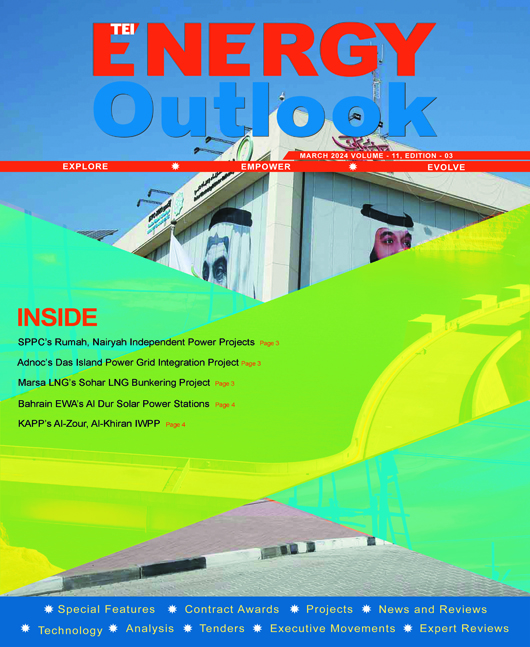
DEWA’s Growth Path
The Emirate of Dubai, the most populous emirate of the UAE, is witnessing expansion across all economic activities.
To keep pace with the growing power and water demand in Dubai, the government-owned utility, Dubai Electricity and Water Authority (DEWA), formed on January, 1992, is developing a world-class infrastructure for electricity and water and providing services according to the highest standards of availability, reliability, efficiency, and quality. At the end of 2023, DEWA raises its production capacity, reaching 15,717 MW of electricity and 495 million imperial gallons per day (MIGD) of desalinated water.
The authority operates and maintains power stations, desalination plants, aquifers, power and water transmission lines, and power and water distribution networks in the Emirate. It also provides various services, including bill payment, a smart collection platform, EV charger card services, electricity, and water management, energy audits, clearance certificate services and tariff calculators.
Most of Dubai's power generation comes from natural gas, but the emirate plans to diversify its energy mix to increase electricity generated from renewable energy sources. This will help achieve the Dubai Clean Energy Strategy 2050 and the Dubai Net Zero Carbon Emissions Strategy 2050 to provide 100% of Dubai’s total power production capacity from clean energy sources by 2050.
Currently, the share of clean energy production capacity is about 17% of Dubai’s total energy mix. The company’s total installed generation capacity is expected to reach 20 GW by 2030. Of this 20 GW capacity, DEWA will have 5.3 GW representing around 27% of the generation, sourced from clean sources.
DEWA uses the latest technologies in water production, transmission, distribution, as well as control of water networks. It uses clean solar energy to desalinate seawater using the latest RO technologies. According to the strategy, 100% of Dubai’s desalinated water production in 2030 will come from a mix of clean energy that combines renewable energy sources and waste heat. This will make Dubai exceed the globally set goal regarding using clean energy in water desalination.
By 2030, DEWA will add 240 MIGD of desalination capacity, using seawater reverse osmosis technology. By that time, DEWA’s total installed desalinated capacity will reach 735 MIGD.
DEWA’s circular economy model meshes economic gains with a sustainability ethos. It seeks to optimize the use of resources while enriching social, economic, and environmental value, thus promoting sustainability.
In the year 2023, DEWA has reduced 9.1 million tonnes of CO2 of which 6.6 million tonnes of CO2 emissions by its efficiency improvement and emission reduction initiatives and 2.5 million tonnes from the operating phases of the Mohammed bin Rashid Al Maktoum Solar Park, which is the largest single-site solar park in the world, using the Independent Power Producer (IPP) model. It has a planned production capacity of 5,000 MW by 2030 using solar photovoltaic panels and concentrated solar power with total investments totalling AED 50 billion.
DEWA is optimistic about its operating and financial outlook for 2024 and beyond. It is focused on its core strategic objective of delivering sustainable growth, staying at the forefront of smart and innovative operational excellence and optimizing returns for all its stakeholders whilst minimizing its environmental footprint.
Editor